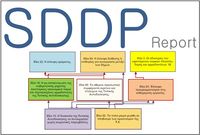SDDP UCYVROK Romania - Descriptors
|
Executive Summary
This interactive workshop based on the Structured Dialogic Design Process (SDDP) was organised
as part of the project “Uniting for Citizenship and participation: Youth promoting Vulnerable group’s
Rights, Opportunities and Knowledge (UCYVROK)”. The main aim of this project is to inform and
mobilise young individuals from less privileged groups and actively promote youth citizenship. The
project also aims at promoting feelings of solidarity, communication and understanding among
youths of Europe and together work towards promoting European cooperation. The project engages
stakeholders to exchange expertise and share best practices of youth organisations working on issues
of cultural diversity, human rights, inclusion, empowerment and active citizenship. The main
goal is to develop a joint vision of European Youth based on generally abiding principles of human
rights, inclusion and cultural diversity. The project team will also develop a Joint Action Plan encouraging
increased participation of less privileged youth in European led activities.
The Triggering Question (TQ) was:
What are descriptors of an ideal society that is culturally diverse and inclusive?
Having classified all ideas according to the clusters, all participants voted for their five most favourable descriptors. The votes are widely spread across the descriptors. The descriptors that received most votes were:
- Possibility for education for everyone in the world;
- Citizenship education is a key course in schools;
- All the people are living in a healthy environment;
- People will feel secure everywhere;
- The citizens are participating in the decision making process;
The voting results were used to select ideas for the subsequent structuring process. The participants managed to structure 27 descriptors that received one or more votes and were selected important according to their interrelations.
The result is the created ‘influence pattern’, showing the root causes facilitating an ideal society which is culturally diverse and inclusive due to the provision of equal education for everybody in the world. The influence pattern consists of five different levels of influence.
The pattern of influence developed in this first part of the workshop is divided into five different levels of influence. Descriptors at the bottom are considered to be most influential. Making progress or achieving results in those bottom descriptors makes it a lot easier to address those that lie higher in the map.
Participants
| Name | Country |
|---|---|
| Andrzej Szozda | Poland |
| Piotv Olsolzki | Poland |
| Oana Nestian | Romania |
| Daniela Cracihn | Romania |
| Paulina Vitovicova | Slovakia |
| Marta Hanecakova | Slovakia |
| Zsofia Szalai | Hungary |
| Kinga Szebegynszki | Hungary |
| Santa Grinberga | Latvia |
| Svetozar Daskalov | Bulgaria |
| Tsena Zhelyazkova | Bulgaria |
